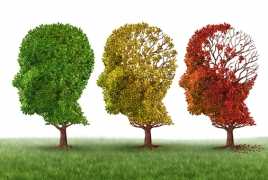Experimental Alzheimer's drug stirs hope after early trials July 26, 2018 - 18:34 AMT PanARMENIAN.Net - After a series of prominent failures, there's reason to be hopeful in the search for a drug to slow the progression of Alzheimer's disease. Results of an early trial of an experimental drug showed that it improved cognition and reduced clinical signs of Alzheimer's in the brains of study participants, and experts are "cautiously optimistic" that the results will be duplicated in future clinical trials, CNN reports. The drug, an antibody called BAN2401, not only reduced the formulation of new beta amyloid clusters in the brain, it reduced existing clusters by 70% on average, American biotechnology company Biogen and Japanese drugmaker Eisai announced Wednesday. The buildup of beta amyloid in the brain is a hallmark of Alzheimer's disease. BAN2401 also provided a 26% to 30% benefit over a placebo in improving cognition in study subjects, researchers said. Details about the immunotherapy were presented at a news conference during the 2018 Alzheimer's Association International Conference in Chicago. "These were people with very mild impairments, some confusion, forgetting someone's name on occasion," said Dr. Lynn Kramer, the chief clinical and medical officer for Eisai. "That's the goal: to stop Alzheimer's disease when it's in the mildest presentation." Reaction from experts was mixed. "I would not say shock and awe," said Dr. Julie Schneider, a professor of pathology at Rush Medical College. "It's encouraging to see some cognitive effect and slowing of disease progression, but I personally think there is a lot more work to be done." Maria Carrillo, chief science officer for the nonprofit Alzheimer's Association, said that a combination of drugs "is the future, and there won't be a sliver bullet to defeat Alzheimer's, so being able to delay the progression of the disease for a couple years would be huge." Dr. Richard Isaacson, who directs the Alzheimer's Prevention Clinic at NewYork-Presbyterian / Weill Cornell Medical Center, said that the research is "impressive on the surface, but we have to be cautiously optimistic. This data may be encouraging, but it's not possible to say for sure. I don't want us to be wrong again," as with previous trials that have failed. BAN2401 is administered intravenously and was being tested in five dosage strengths in 856 patients with either mild cognitive impairment or early-stage Alzheimer's in a phase two trial, which assesses a medication's dosage. Hope that the drug would be a viable treatment had waned in December when participants failed to show significant improvement by the study's first goal of 12 months. However, Biogen recently said the highest dose of 10 milligrams per kilogram of a patient's body weight, given biweekly, showed statistically significant success at the study's 18-month completion. Kramer said Eisai and Biogen had reached out to regulators in the United States, Europe and Japan to discuss results and next steps. The company has said it hoped to obtain accelerated approval. "This was only a phase two trial, and it's not going to be approved by the Food and Drug Administration until results from the next larger trial are in," explained Keith Fargo, director of scientific programs at the Alzheimer's Association. "Accelerated approval just means you go to the front instead of the back of the line." For patients anxiously waiting for help, Fargo warned that it will be several years before the drug is available, assuming it's successful in the phase three trial, which will involve a larger group of patients. "You are not going to be able to go to the doctor and get this anytime soon," Fargo said. Azerbaijani authorities report that they have already resettled 3,000 people in the Nagorno-Karabakh town of Stepanakert. On June 10, Azerbaijani President of Azerbaijan Ilham Aliyev will leave for Turkey on a working visit. Azerbaijani President Ilham Aliyev arrived in Moscow on April 22 to hold talks with Russian counterpart Vladimir Putin. Authorities said a total of 192 Azerbaijani troops were killed and 511 were wounded during Azerbaijan’s offensive. Partner news |